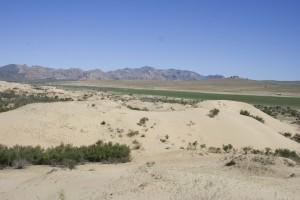 The recent announcement of a major new wind energy farm project in Mongolia could represent an early step towards the establishment of an envisioned electricity “super grid,” powered by renewable energy resources, connecting across Asia.
The recent announcement of a major new wind energy farm project in Mongolia could represent an early step towards the establishment of an envisioned electricity “super grid,” powered by renewable energy resources, connecting across Asia.
The Softbank Corporation announced on October 24 that its green energy subsidiary, SB Energy Corporation, had formed a joint venture with Mongolia’s Newcom Group to develop four wind farms in the Gobi Desert. The first of these wind farms, which will be capable of generating 300,000 kilowatts of electricity, is slated to go online as early as 2014. Electricity generated for the project will be sold to a local utility, with the possibility that it could be exported to Russia and other Asian economies in the future.
The prospect of Gobi Desert wind farms supplying green power to Mongolia’s neighbors meshes closely with the vision of an “Asia super grid” announced by Softbank Chairman and CEO Masayoshi Son at an international symposium organized by the Japan Renewable Energy Foundation (JREF) in March 2012. Tapping into the immense potential for solar and wind energy generation in Mongolia’s Gobi Desert—estimated to have the capability of covering two-thirds of world energy needs—this envisioned grid would make available a stable and affordable supply of green energy to users all across east Asia.
Son is one of the leading voices in Japan’s business community calling for the elimination of nuclear energy in the wake of the Fukushima nuclear disaster. Softbank’s energy subsidiaries have already broken ground on the first of several planned “mega solar” power farms to be constructed across Japan, which aim to increase Japan’s presently very low levels of green energy (renewable energy, excluding hydropower, accounted for 1 percent of Japan’s total energy consumption in fiscal 2009). Further increasing this supply of green power—and making it cost-competitive for consumers—undoubtedly will require significant reform of Japan’s energy regulatory framework, a discussion that the Japanese government has already started.
However, what if it were possible to augment these domestic efforts by connecting Japan with other countries well-endowed with renewable energy resources, further increasing access to and reducing their costs to consumers? This is where the Asia super grid idea comes in. Also powering this vision are the potential benefits generated by a project of this nature transcending national borders, not only to build efficient economies of scale but also to foster increased regional cooperation around addressing shared challenges and needs. It parallels the concept of DESERTEC, an initiative bringing together scientists, economists, and political leaders working to develop an electricity grid powered by renewable resources across Europe and North Africa, promoting development and combating climate change through these efforts.
The JREF symposium (which can be viewed in its entirety here) featured extensive discussion among experts from Asia and Europe about the feasibility of building an Asia super grid, considering existing technologies and energy grid structures along with technical, regulatory, and other policy issues that would need to be overcome. These range from the massive new infrastructure necessary to support an Asia-wide electricity grid, and figuring out how to supply sufficient power during peak use times, to national security concerns related to the grid. Regulatory and policy barriers in Asian countries were, however, pinpointed by participants as particularly challenging. In Japan’s case, deregulation to unbundle energy supply and distribution, along with greater transparency in power rates, were identified as essential priorities.
Several of the territorial disputes that have flared up in east Asia in recent months are rooted, in part, in competing claims over potential oil and gas resources. While the development of an Asian super grid may do nothing in and of itself to quell those tensions, it presents a potential arena in which Japan, China, and Korea could partner together, along with Mongolia and other countries, to constructively advance shared economic and environmental goals down the road. The first building blocks for this could be going up in the Gobi Desert now.

